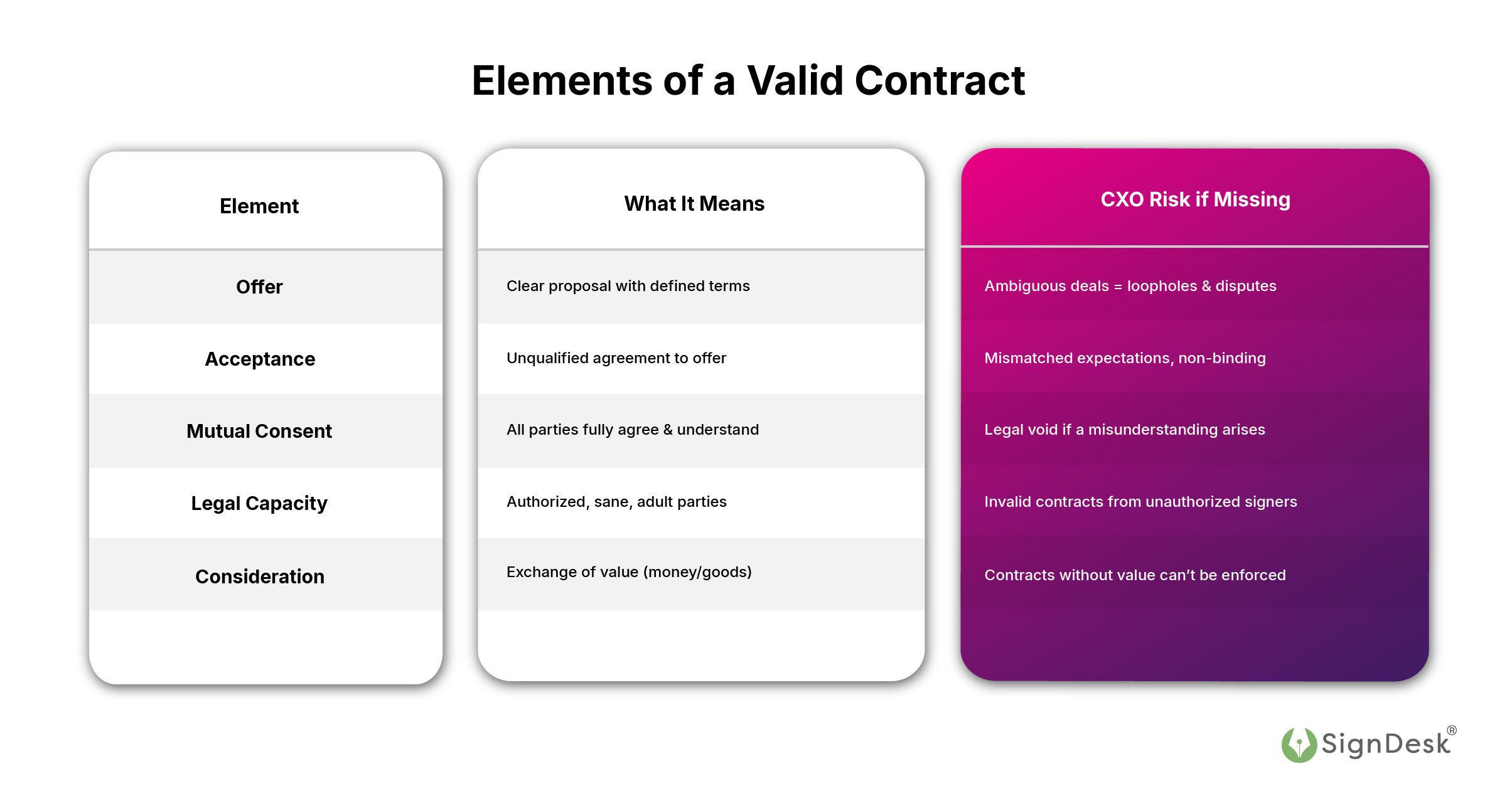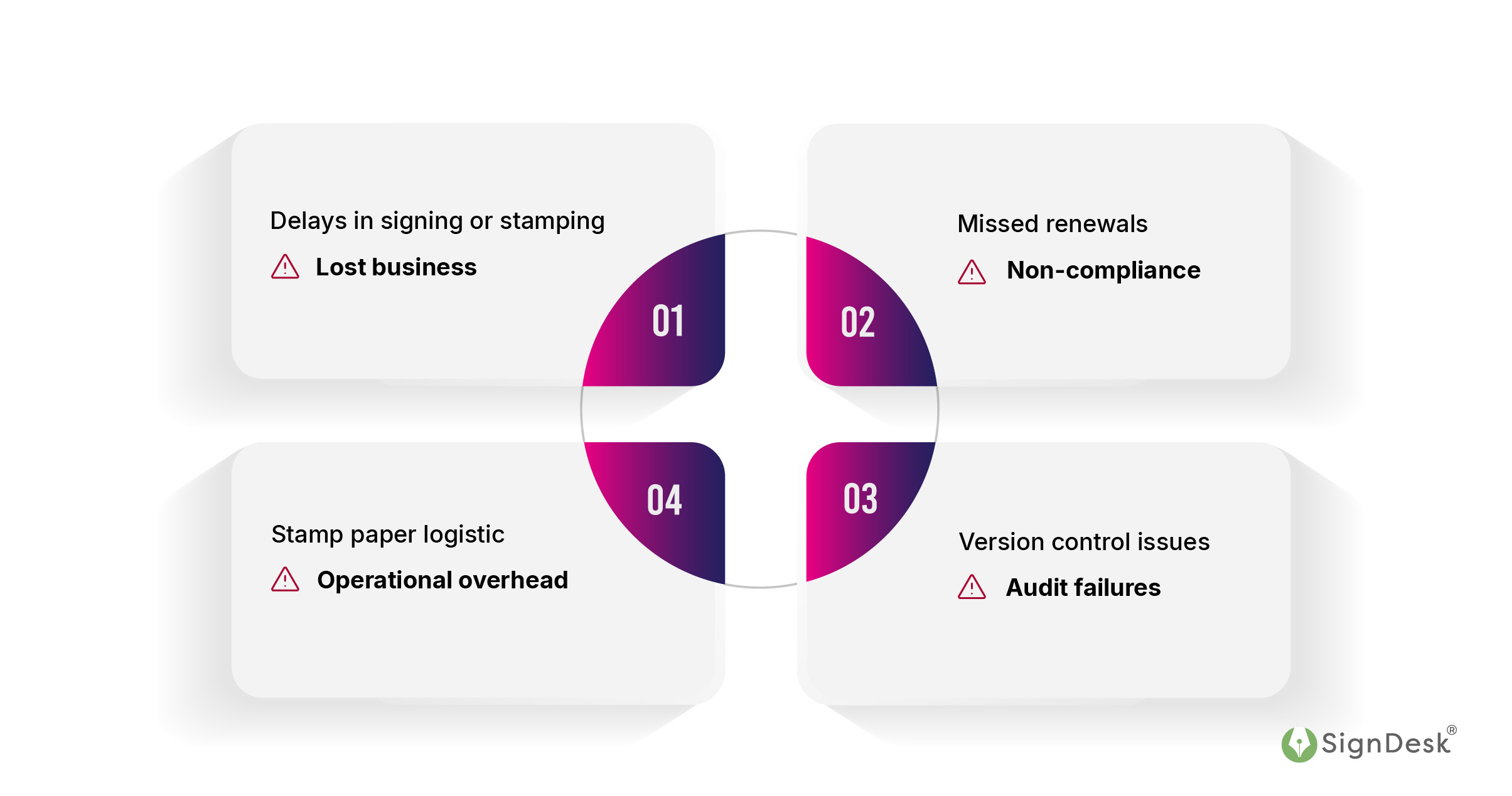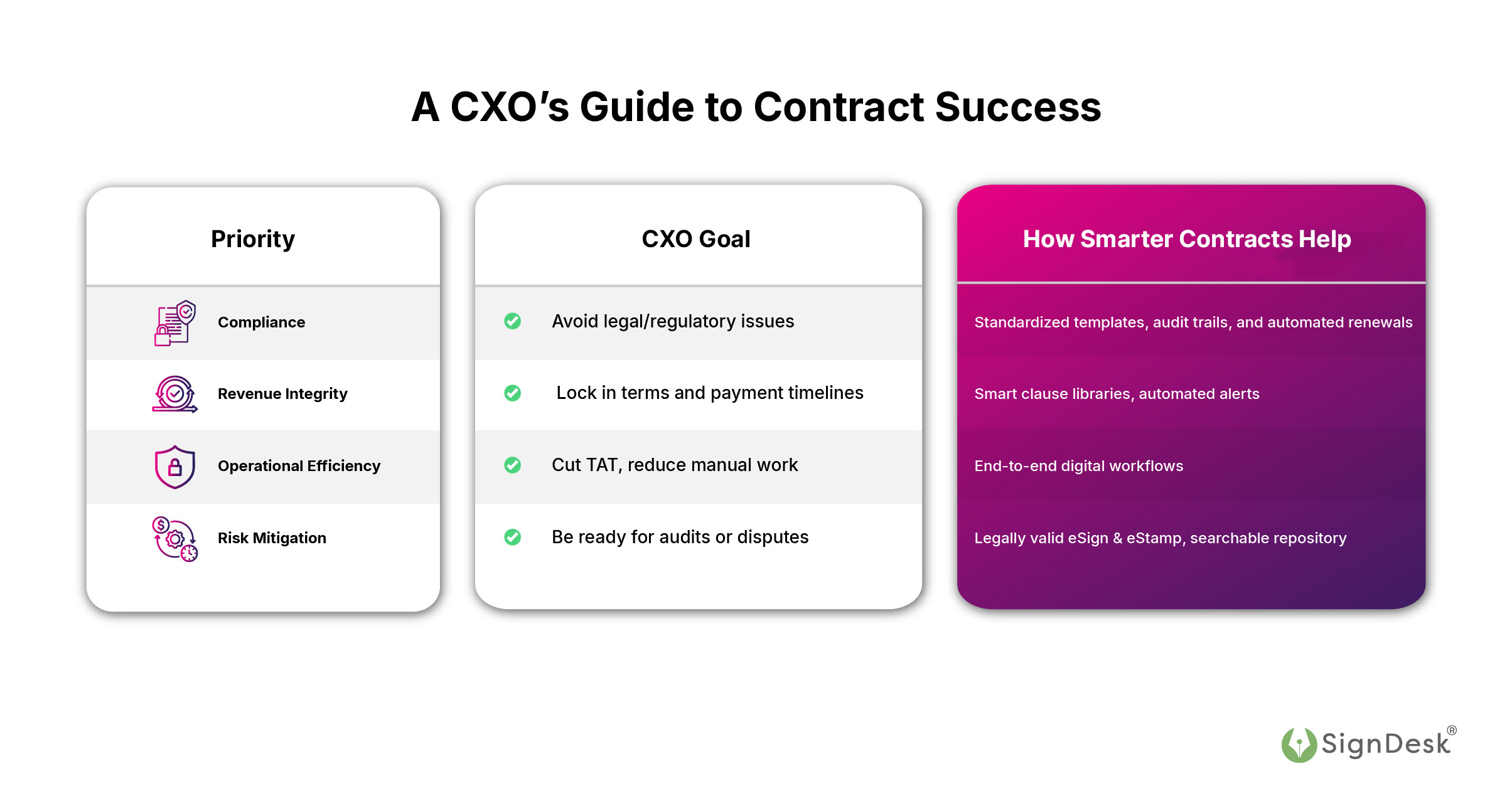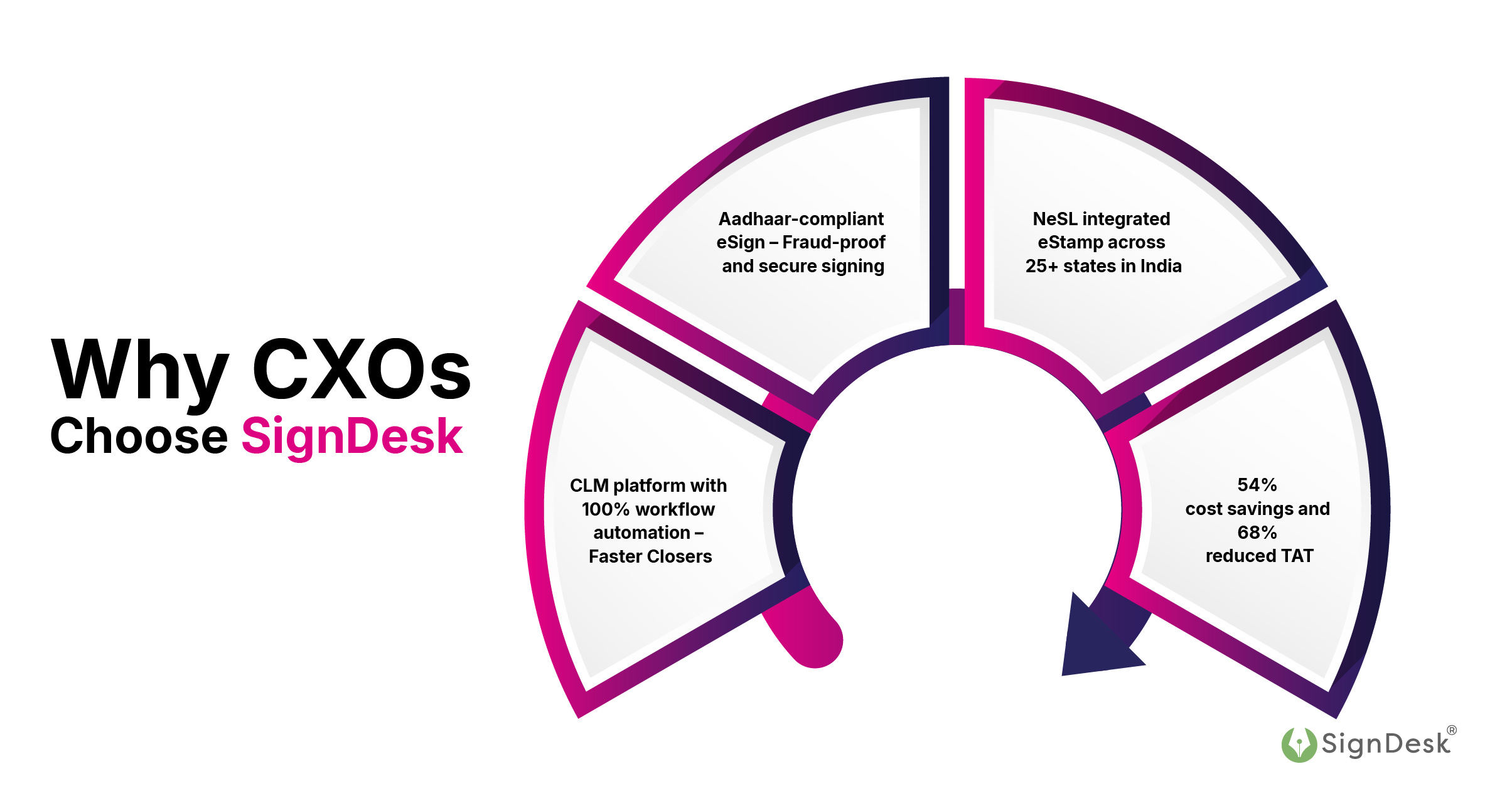Contracts, a legally binding agreement between two or more parties, are the foundation of your business! They control 80% of your enterprise, but poor contracting could be costing you up to 9% in lost revenue. Missed renewals, manual errors, and legal delays drain profits, trigger compliance risks, and damage relationships.
Smart CXOs know that treating contracts like paperwork is suicidal. For them, the real contract meaning lies in operational performance control. Today’s CXOs need smart, AI-driven systems that reduce costs, accelerate execution, and ensure every agreement is audit-ready.
That’s where SignDesk’s AI-powered CLM platform comes in – empowering 3,000+ enterprises to cut contract TAT by over 60% and reduce operational costs by 54%.
Ready to future-proof your contracts? Let’s dive in.
What is a Contract: Meaning & Its Legal Validity and Strategic Importance in Enterprise
At its core, a contract is a written agreement between two or more parties that is legally enforceable. It lays out:
- What each party agrees to do (or not do),
- The timelines for these actions,
- What happens if something goes wrong?
In simpler terms, a contract is a promise backed by law.
More importantly, the legal validity of a contract confers enforceability in a court of law; this is what transforms a simple promise into a business asset.
Beyond legalities, the actual contract meaning in an enterprise lies in its ability to deliver business outcomes. Contracts govern the flow of money, goods, services, and data, turning strategic intent into measurable results.
In an enterprise setting, contracts serve key purposes across departments:
- Procurement & Vendor Onboarding: Define pricing, service-level agreements (SLAs), delivery timelines, and escalation mechanisms.
- Finance: Establish terms for receivables, payables, taxation, and compliance audits.
- HR & Operations: Govern employment terms, confidentiality, and internal governance.
- Compliance & Risk: Ensure regulatory adherence, audit readiness, and dispute prevention.
This makes it critical for CXOs to understand contracts not only as legal tools but also as operational assets that unlock business value.
Wondering why contracting is slowing everything – and how to fix it?
What Makes a Contract Legally Enforceable? A CXO’s Checklist
Every valid contract must meet 5 core criteria. Miss one, and your deal might not stand up in court. The following are the five key elements of a valid contract.

|
Element
|
What It Means
|
CXO Risk if Missing
|
|
Offer
|
Clear proposal with defined terms
|
Ambiguous deals = loopholes & disputes
|
|
Acceptance
|
Unqualified agreement to offer
|
Mismatched expectations, non-binding
|
|
Mutual Consent
|
All parties fully agree & understand
|
Legal void if a misunderstanding arises
|
|
Legal Capacity
|
Authorized, sane, adult parties
|
Invalid contracts from unauthorized signers
|
|
Consideration
|
Exchange of value (money/goods)
|
Contracts without value can’t be enforced
|
⚠️ Missing any of these leads to:
- Legal disputes
- Delayed executions
- Audit and compliance red flags
This is why CXOs and related executives need to have clarity on the contracts they are involved with.
Continue to the next section, where we will discuss contract clarity in detail.
Top 3 Reasons Why Contract Clarity is Non-Negotiable for CXOs
The fine print of a contract governs every key business process. And yet, most CXOs lack the visibility and tools to monitor these critical documents at scale. Below are the significant reasons why contract clarity should be at #1 on your priority list.
1. Revenue Protection: Contracts Secure Every Penny
In regulated sectors like BFSI, Insurance, and Telecom, revenue majorly depends on contractual terms. Payment timelines, pricing adjustments, penalties, and service-level agreements (SLAs) are all defined within contracts.
When these aren’t drafted clearly or managed proactively, revenue leakage is inevitable.
|
🔍 Did you know? Revenue leakage due to contract mismanagement can range up to 9% of annual revenue. Moreover, businesses end up spending over $50,000 on complex contracts.
|
Consider this: In India, a ₹1000 crore enterprise could be silently losing ₹50 – ₹100 crore annually only due to contract inefficiencies. – Scary, right? It shouldn’t be.
2. Risk Management: Contracts Help Contain Legal & Operational Exposure
Contracts reduce uncertainty by clearly defining who is responsible, what is expected, and what happens when things go wrong. They serve as the first line of defense in vendor disputes, audits, and compliance checks.
|
🔍 Did you know? As per research, 62% of organizations have experienced a critical risk event in the past three years.
|
Without centralized access or audit trails, businesses often scramble during disputes. Or worse, remain unaware of contract breaches until it’s too late. CXOs must ensure contracts are created securely, tracked, updated, and enforced systematically.
3. Compliance: Contracts Anchor Regulatory Alignment
In high-stakes industries, compliance obligations are woven directly into contracts. These include clauses for data privacy, consent, grievance redressal, KYC norms, and regulatory disclosures.
This makes contract clarity more than a legal need – a compliance imperative. Inaccuracies or missing clauses can result in regulatory penalties, damage a brand’s reputation, or lead to license revocation.
When contracts are transparent, accessible, and enforceable, risks are reduced, compliance becomes proactive, and revenue improves.
How Smart CLM Workflows Solve Real CXO Problems: The Contract Lifecycle Explained
Every enterprise contract goes through a defined lifecycle — from initial creation to final storage. Each step, if handled manually, becomes a potential bottleneck for compliance, speed, and cost.

|
The Cost of Manual Contracting!!!
Manual contract processes introduce risk and inefficiency
|
|
Delays in signing or stamping → lost business
Missed renewals → non-compliance
Version control issues → audit failures
Stamp paper logistics → operational overhead
|
And in regulated industries, these are not minor issues; they’re board-level concerns. So, what’s the solution?
A Digital Contract Lifecycle For Better Business Outcomes
Modern enterprises are shifting to automated contract lifecycle management (CLM) solutions. These platforms transform how contracts are created, signed, stamped, executed, and monitored.
Here’s how automation improves each stage of the contract lifecycle:
1. Drafting
✅ Use smart templates to create error-free contracts in minutes.
✅ Pre-fill party data and clauses based on business rules.
2. Negotiation
✅ Collaborate in real-time with internal teams and vendors.
✅ Track changes and maintain a single version of the truth.
3. Approval
✅ Route contracts through dynamic approval chains.
✅ Set role-based access and enable digital reviews.
4. eSign & eStamp in Contracts
✅ Enable Aadhaar-based eSign or DSC eSign for legal compliance.
✅ Automate eStamp duty across regions with zero stock issues.
5. Execution
✅ Complete signing and stamping in one flow – no courier, no printouts.
✅ Instant notifications and audit logs ensure transparency.
6. Archival
✅ Store contracts in a centralized digital repository.
✅ Enable auto-alerts for expiry, renewals, and audits.
A CXO’s Guide to Contract Success

With innovative CLM platforms like SignDesk, businesses reduce contract TAT by 68%, improve compliance accuracy by 88%, and save over 50% in operational costs. You can do it too!
Transform Contracts into Business Accelerators with SignDesk’s Smart Contract Stack
As we know, contracts today are strategic tools that shape revenue, compliance, and growth. SignDesk has created a smart contract stack combining Contract Lifecycle Management (CLM), eSign, and eStamp into a single, secure, and scalable platform.
Here’s how this stack helps you lead smarter.
Contract Lifecycle Management (CLM): Cut Creation Time, Boost Control
|
|
✅ Draft contracts in minutes using pre-approved templates and clauses. Autofill terms with dynamic forms and route for pre-draft internal approvals.
✅ Collaborate live with stakeholders and digitally execute contracts with integrated eSign and eStamp. Receive automated reminders so you never miss deadlines.
✅ Track edits and activities in real-time, monitor compliance, and utilize analytics dashboards to make informed decisions more quickly.
✅ Bulk upload existing contracts, apply smart tags, and work directly from MS Word. Easily integrate verification checks, such as GSTIN, for seamless compliance.
✅ Use the AI-Assistant that can help you solve any query related to your contracts, in your language.
|
| 📌 Result? Fewer errors, 70% accelerated collaboration, and airtight control over every contract. |
eSign: Sign Contracts at Scale – Securely and Seamlessly
|
|
Send documents to multiple signers in seconds, across geographies. Perfect for high-volume workflows and remote teams.
Choose from six signature styles, attach your logo, and use your letterhead – every document reflects your brand identity.
Signer identity is verified with geofencing, liveness detection, and AI face match.
Let users sign in multiple Indian languages and send signing links via WhatsApp for faster response and engagement.
|
|
📌 Result? 100% Legal-grade execution with zero manual effort and fraud-proof signing.
|
eStamp: Real-Time Duty Payment Across 25+ States
|
| Instantly pay state stamp duties via a secure master wallet. Merge and stamp multiple agreements with one click.
Every stamp action is logged, traceable, and aligned with compliance needs. Seamless NeSL integration ensures regulatory transparency.
Enable co-branded stamping portals with your company’s theme, logo, and process visibility across teams and partners.
📌Result? 68% less TAT while staying compliant and eliminating human error. |
For today’s enterprises, contracts are a digital infrastructure. With SignDesk’s CLM, eSign, and digital stamping stack, CXOs can automate complex workflows – and many of them did…
Story of TTK Prestige – Took Contract Execution from 30 days to 20 minutes with SignDesk
TTK Prestige, a leading name in the home appliance industry, was facing a common enterprise hurdle. It included slow, manual contract cycles that took up to 30 days to finalize. Unavailable signatories and high operational costs caused delays.
By adopting SignDesk’s Contract Lifecycle Management (CLM), they unlocked a game-changing transformation. Contract turnaround times dropped from weeks to just 20 minutes, enabling faster vendor onboarding and internal approvals.
The organization also achieved a 30% reduction in operational costs by eliminating printing, scanning, and couriering. With a 100% digital, secure, and automated contract workflow, TTK Prestige built true contract confidence.
Why CXOs Choose SignDesk

|
CLM platform with 100% workflow automation – Faster Closers
|
Aadhaar-compliant eSign – Fraud-proof and secure signing
|
NeSL integrated eStamp across 25+ states in India
|
54% cost savings and 68% reduced TAT
|
We’re already powering contract operations for over 3,000 enterprises, including HDFC Bank, Kotak, Axis, Mahindra, and many more.
|
Because when contracts are done right, business runs right.
|